WASHINGTON, D.C. -- As Americans cast their ballots in this year's historic presidential election, just 18% are very confident that votes across the country will be accurately cast and counted, down sharply from 29% who said so just prior to the 2004 election.
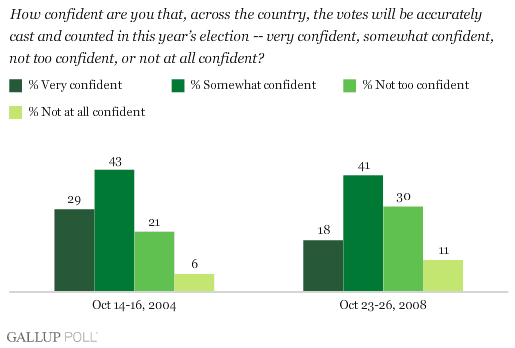
In 2000, the Florida recount debacle focused the nation on basic problems in getting the votes counted in the world's most admired democracy. This year, concerns about voter irregularities have focused primarily on efforts to register new voters en masse. Particularly, the community-organizing group ACORN, which has helped to register nearly half a million low-income, minority, and young voters nationwide, has been linked to voter registrations that have been determined to be fraudulent or duplicates. Republican presidential candidate John McCain has since alleged that ACORN is "on the verge of maybe perpetrating one of the greatest frauds in voter history in this country" and Republican lawyers have challenged new-voter registrations in several states.
Possibly reflecting the coverage of the ACORN controversy, nearly half of Americans (44%) say they expect votes cast by people who are ineligible to be a "major problem" in this year's election. This is nearly double the percentage (24%) from four years ago, with the heightened concern driven largely by Republicans and independents.
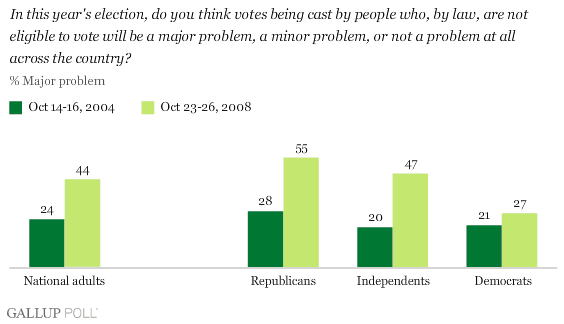
McCain supporters are far more likely than Barack Obama supporters to be concerned about ineligible votes being cast. Two in three McCain supporters (65%) say they think ineligible votes will be a major problem, compared to just one in four Obama supporters (25%).
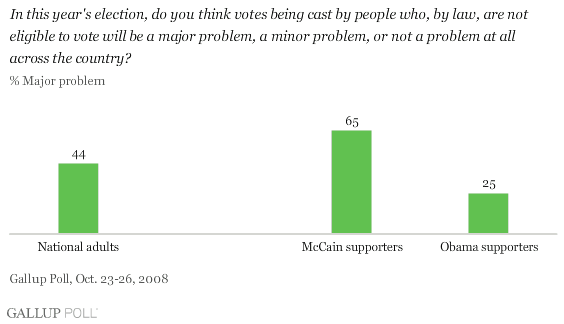
Concern about eligible voters' not being allowed to vote has also increased since 2004, but not to the same extent. Overall, 32% of Americans say they think it will be a major problem, up slightly from 25% four years ago. Republicans and Democrats each show an 8-point increase in their level of worry about this -- slightly larger than the increase among independents.
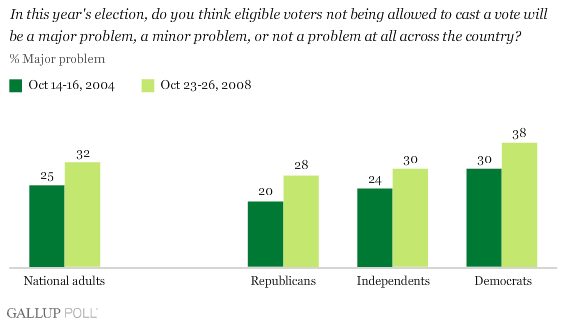
While Obama supporters are more likely than McCain supporters to be worried about the possibility that eligible voters will be denied the opportunity to vote, 36% to 26%, this 10 percentage-point gap pales in comparison to the 40-percentage point divide evident when supporters of the two candidates are asked about ineligible voters.
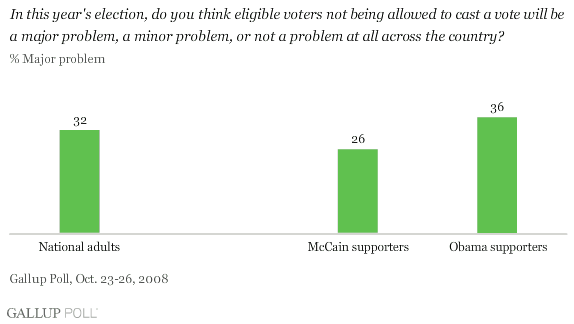
All in all, these results suggest concern about eligible voters' being denied the chance to vote has not struck as much of a chord among Americans as the possibility of ineligible voters' being allowed to cast ballots.
With Gallup predicting a higher turnout than in past elections this decade, one might fairly assume there will be an increase of reported problems at the polls, be they regarding voter eligibility or any other number of things that might go wrong with a particular location or type of machine. While Gallup finds just 2 in 10 Americans very confident in the country's ability to run a fair and accurate election, the 4 in 10 (41%) who are "somewhat confident" appear willing to give the country's electoral process the benefit of the doubt. Overall, Americans are clearly less confident than they were four years ago, meaning this Election Day could serve either to help bolster confidence or to further diminish it.
Survey Methods
Results are based on telephone interviews with a half sample of 1,010 national adults, aged 18 and older, conducted Oct. 23-26, 2008. For results based on this half sample, the maximum margin of sampling error is ±5 percentage points.
Interviews are conducted with respondents on land-line telephones (for respondents with a land-line telephone) and cellular phones (for respondents who are cell-phone only).
In addition to sampling error, question wording and practical difficulties in conducting surveys can introduce error or bias into the findings of public opinion polls.
